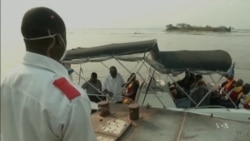The international medical aid group Doctors Without Borders says the world is losing the battle against Ebola and warns the deadly virus will not be stopped unless wealthy nations dispatch specialized biological disaster response teams to West Africa.
The organization's president, Joanne Liu, said Tuesday that her group, which has treated more than 1,000 Ebola patients in West Africa since March, is completely overwhelmed by the disease.
"In Sierra Leone, infectious bodies are rotting in the streets. Rather than building a new Ebola care center in Liberia, we are forced to build crematoria," said Liu.
Her warnings were echoed Tuesday by the head of the U.S. Centers for Disease Control and Prevention.
Dr. Tom Frieden the situation is now the world's first Ebola epidemic, given how widely it's spreading. He cautioned that while there is a window of opportunity to fight the disease, "the window is closing."
Meanwhile in Liberia, a missionary organization announced that another American doctor has become infected. Serving in Mission said the obstetrician was not treating Ebola patients at the hospital in Monrovia. It did not elaborate how the he contracted the virus.
Also Tuesday, U.S. President Barack Obama joined the fight against Ebola, recording a message for West Africans on how to avoid and treat the deadly disease.
In a video released by the White House, Obama warns people in Guinea, Liberia, Nigeria and Sierra Leone not to touch the blood, sweat or other body fluids of Ebola patients, and to avoid contaminated items such as used needles.
He warned that those killed by the disease remain contagious.
"When burying someone who has died from this terrible disease, it’s important to not directly touch their body. You can respect your traditions and honor your loved ones without risking the lives of the living," said Obama.
The West African Ebola outbreak, which has now spread to Senegal as well, has killed more than 1,500 people this year.
The United Nations says the West Africa outbreak has put harvests at risk and sent regional food prices soaring.
The U.N. Food and Agriculture Organization issued the warning Tuesday in a special alert for Liberia, Sierra Leone and Guinea, the three countries most affected by the outbreak.
The FAO said that in those three countries, quarantine zones and restrictions on people's movement aimed at combating the virus have "seriously curtailed the movement and marketing of food."
The agency said this has led to panic buying, food shortages and major price increases for some commodities. The FAO also warned that labor shortages on farms due to movement restrictions and workers leaving for other areas will seriously impact farm production and jeopardize the food security of many people.







